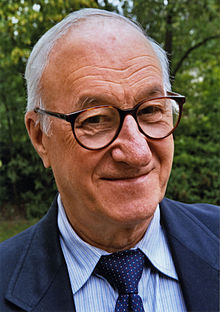Albert Bandura
| Albert Bandura OC | |
|---|---|
 |
|
| Born |
December 4, 1925 Mundare, Alberta, Canada |
| Nationality | Canadian/American |
| Fields | Psychology, Philosophy of Action |
| Institutions | Stanford University |
| Alma mater |
University of British Columbia University of Iowa |
| Known for |
Social cognitive theory Self-efficacy Social learning theory Bobo doll experiment Human agency Reciprocal determinism |
| Influences | Robert Sears, Clark Hull, Kenneth Spence, Arthur Benton. Neal Miller |
| Influenced | Cognitive psychology, Social psychology |
Albert Bandura OC (/bænˈdʊərə/; born December 4, 1925) is a psychologist who is the David Starr Jordan Professor Emeritus of Social Science in Psychology at Stanford University. For almost six decades, he has been responsible for contributions to the field of education and to many fields of psychology, including social cognitive theory, therapy, and personality psychology, and was also influential in the transition between behaviorism and cognitive psychology. He is known as the originator of social learning theory and the theoretical construct of self-efficacy, and is also responsible for the influential 1961 Bobo doll experiment.
Social learning theory is how people learn through observing others. An example of social learning theory would be the students imitating the teacher. Self-efficacy is "the belief in one’s capabilities to organize and execute the courses of action required to manage prospective situations." To paraphrase, self-efficacy is believing in yourself to take action. The Bobo Doll Experiment was how Albert Bandura studied aggression and non-aggression in children.
A 2002 survey ranked Bandura as the fourth most-frequently cited psychologist of all time, behind B. F. Skinner, Sigmund Freud, and Jean Piaget, and as the most cited living one. Bandura is widely described as the greatest living psychologist, and as one of the most influential psychologists of all time.
...
Wikipedia
